One of the great things about rural general practice is the places you travel to, to see your patients. I got to experience the Falklands version of this recently.
There are two main islands; East Falkland and West Falkland and less than a dozen other populated islands. By populated I mean one or two families live on them! And by families I mean anything from a couple to a three generation household of 10! The township of Stanley is located on East Falkland and there are around 35-40 small settlements (consisting of up to a dozen households) spread out over the remainder of East Falkland and throughout West Falkland. Everywhere outside of Stanley is referred to as “camp” derived from the word campos meaning countryside.
As the only health facilities in the Falklands are in Stanley it is a bit difficult for camp residents to access healthcare. Adaptations have therefore had to be made. Every day one of the GPs in KEMH has several appointment slots set aside for telephone consultations. anyone in camp is able to ring up and request one of these slots where they can discuss any problems with the doctor. It was actually not that long ago that these consults were conducted via two-way radio! According to the locals everyone used to gather around their radio sets during the doctors allocated time and listen in to everyone’s consults!! So much for patient confidentiality!Obviously there are limitations to telephone consults as you can’t even examine the patient let alone perform any necessary investigations! There are 31 medical chests spread out around the Islands. These chests contain a fairly comprehensive selection of medications for camp residents. If the doctor wants to prescribe a medication for a camp resident then they are able to go to their closest medical chest and get the medication immediately. This prevents delays in treatment from trying to fly drugs out of Stanley everyday. Each chest is looked after by one person who keeps records of what goes in and out of the chest. Fortunately dishonesty is not a common trait in Falkland Islanders as a system like this could easily be abused! It seems to work very well here though and means there are medications available in times of emergency.
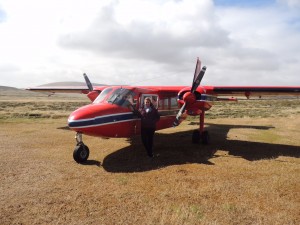
Every Tuesday on the Falkland's, a GP is flown to a few of the settlements to see patients. Rebecca joined the service to West Falkland.
The first patient was a nice and easy medication review. He needed some routine bloods taken so it was out with the equipment bag which has everything you might need for any basic investigation or examination. The second patient was also a medication review but also needed her leg checked out as she had developed a nasty haematoma on her leg after a cow kicked a milking stool into her!
After taking another set of routine bloods and reassuring her the haematoma would eventually go down it was in with the next patient. This person suffered from depression and wanted to discuss their citalopram dose. I felt they were in a rather precarious situation. They lived alone and around an hour’s drive from their nearest neighbours in the middle of West Falkland. Their social supports are nearly non-existent.This case really highlighted the isolation of this place for me. I take my hat off to the people who live out here in the middle of nowhere forging their livelihood out of the land. They are often hours away from their nearest neighbours and can go for weeks without seeing another person. I certainly couldn’t live in that much isolation. That makes things difficult managing these sorts of patients.
We can’t ensure we have a follow up appointment in a few days time to check how they are going as the doctor won’t be back out there for another 5 weeks. So we have to rely on the telephone service to check in. We discussed that it was important for the patient to check in with neighbours every day or so and to call the hospital anytime if they need to. We adjusted the citalopram dose slightly and they seemed to leave us in relatively good spirits but there is always a slight gnawing doubt about what could happen out here in the middle of no man’s land.
The last patient had had some hip pain so we prescribed some analgesia and arranged for her to have an x-ray the next time she was in Stanley. Obviously word got around the doctor was in camp as on the way out the door we quickly advised a woman that her sore thumb was nothing to worry about and that a 4 year old boy had a viral infection which should clear up by the end of the week. A doctor’s work is never done!At the next settlement we only had two patients to see, a husband and wife. They both thought they would be quick consults so we forgo the tea and cake and set up shop in the back of the land rover on the side of the airstrip. Very typical rural medicine!! They were both straight forward reviews. The man had lower back pain which was improving but he needed a repeat script for tramadol. The woman I had actually met the week before with the visiting orthopaedic surgeon. She had had great results from the steroid injection to her painful knee but was continuing to have some hip problems so we also arranged for her to have an xray next time she was in Stanley.
It was then out of the Rover and back to the plane to head for home, stopping on the way to pick up a working dog who had a suspected broken leg. He was taken straight to KEMH as well as the vets use our xray department too! The flight service is brilliant in the Falklands. Two planes fly out of Stanley everyday and will take you to and from any airstrip you want. They are happy to make detours if anything urgent comes up and will often bring patients into Stanley if the doctor deems it necessary.
I got to sit in the cockpit the whole way and the pilots are brilliant at pointing out interesting features. We swooped down low over the sea so we could see through a massive rock arch, we circled around over an island to get amazing views of a herd of wild South Georgian Reindeer, then managed to spot whales in the Falkland Sound as well. Flying is definitely the best way to get to and from work!!
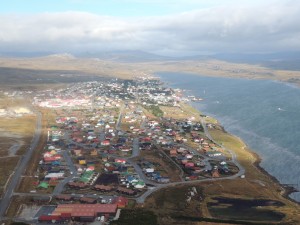
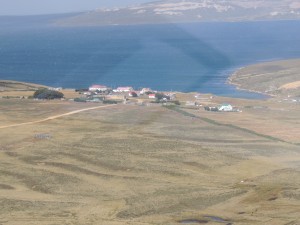
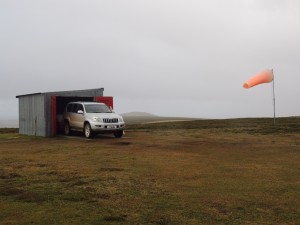
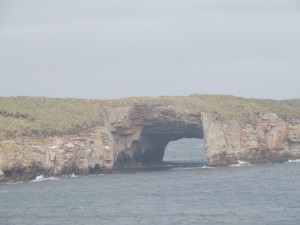
1 Comment to 'Blog 3: Flying to work by Rebecca Craw'
April 11, 2014
Great experience for you and wonderful stories. Keep writing more adventures. And dont for get to keep them and photos for later on to look back on. Kirsty
Leave a comment